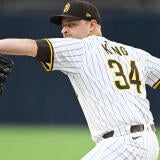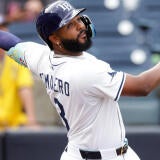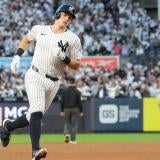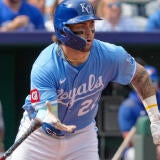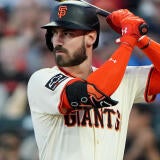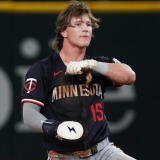2024 Fantasy Baseball Draft Prep: Late-round category sleepers for pitchers to target in all roto drafts
Chris Towers breaks down what you need to know to win every pitching category in a 12-team Rotisserie league
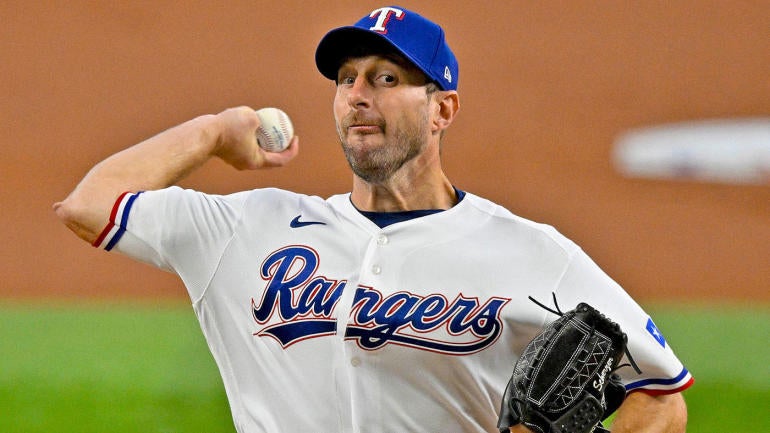
Here's what you needed to win every pitching category in a 12-team Rotisserie league on CBSSports.com last season: a 3.456 ERA, 1.153 WHIP, 97 wins, 91 saves, and 1,469 strikeouts. Every year is different, of course, but with no new significant rule changes coming to the game in 2024, we can be somewhat confident that the offensive environment in MLB will be similar to what it was last season.
In a perfect world, you'd just draft a pitching staff that is strong in all five categories and go run roughshod over your competition, but this isn't a perfect world, so that's a lot easier said and done. Every draft is going to require sacrifices in one category or another, and you're going to reach a point in every draft where you find you have some ground to make up.
This column is all about helping you when those points come. For the most part, we're looking for true late-round options -- guys being drafted outside of the top 200 in ADP -- but we'll sneak a few top 200 names in here if I feel like they're undervalued. But the point is, these are options you might be able to pivot to if you happen to notice your roster is starting to look weak somewhere on the pitching side -- and we already covered the hitter categories here.
ERA
- Michael King – ADP: 152.32
- Max Scherzer – ADP: 299.62
- Bryan Abreu – ADP: 356.23
- Brusdar Graterol – ADP: 486.16
- Clayton Kershaw – ADP: 514
Alright, look … good pitchers tend to have good ERAs, and good pitchers tend to be quite expensive, so there aren't a lot of options here. King is one potential exception, since the concerns about him aren't around whether he'll be good – he has pitched 247.2 innings in the majors with a 3.38 ERA, and showed last season he can remain effective even in a starting role. The question is whether he can do that over a full season while holding up, given his injury issues even in a relief role. However, he's moving to a team that is definitely going to give him a chance to start, and he'll be playing in a much better park for pitching. If King can hold up and give us 150 innings, he should be a very strong source of ERA.
After him, we've got a couple of non-closing relievers. It's not a profile most Fantasy players prefer to draft, but especially in Abreu's case, there's still a ton of value in it, even if he doesn't get saves. Abreu has a 1.84 ERA over the past two seasons, with 188 strikeouts combined. Even as a non-closer – and Abreu would probably need injuries to both Josh Hader and Ryan Pressly to have a chance at saves – the ATC projections system still has him as a $5 player for 2024, comparable to guys like Eduardo Rodriguez and Hunter Brown, who tend to get drafted in most leagues. You probably don't want to draft Abreu as a starter, but with a bench pick, he's a super-valuable option to have around when injuries crop up or you just don't like the matchups for your fringier starters.
And then we've got guys like Kershaw and Scherzer, who we're pretty confident are going to be very good when they're out there, we just don't know when that will be. Drafting them requires having IL spots to play with, and it becomes harder in leagues where you only have a few – you'll inevitably have a few IL trips to deal with in April, and you might have to make some tough decisions about higher-end guys. Both are well into the back half of their careers and are coming back from offseason surgery, with the hope of a mid-season return – hopefully in June for Scherzer, and more like August for Kershaw. If they come back right, both could provide a nice second-half boost if you can keep them around.
Wins
- Chris Bassitt – ADP: 137.83
- Shane Bieber – ADP: 173.59
- Eduardo Rodríguez – ADP: 191.6
- Nathan Eovaldi – ADP: 206.32
- Brayan Bello – ADP: 230.24
Wins are a tough category to target, obviously, because wins are both incredibly valuable for Fantasy and very tough to predict. But, ideally, you're looking for pitchers who can go deep into games while pitching for good teams. Pretty much everyone here fits that bill, with Bello probably the biggest question mark, given his youth. He averaged 5.6 innings per start last season, but he also threw at least 95 pitches in 16 of his 28 starts, so it's not like the Red Sox babied him. If he takes a step forward, his strong control and groundball tendencies could make him a surprisingly good source of volume, and hopefully wins on a Red Sox team that should at least be average, if not a little better.
The rest of the group are varying levels of boring elder statesmen at the position, with the most interesting possibly being Bieber. He only won six games last season, in part due to injuries that limited him to 21 starts, so he has to stay healthy while also bouncing back from his worst season since he was a rookie. However, we've seen video of Bieber working out at Driveline's facilities this offseason, and the work seems to have paid off, as his fastball velocity in one recent session averaged 93.2 mph – he was down to 91.3 mph last season. It's only one session in the offseason to go on (with data shared by the organization working with him, which has a vested interest in playing up the positives, I'll note), so you shouldn't be expecting Bieber to suddenly turn the clock back to his ace days. But it's a reason for optimism, especially at his price.
Strikeouts
- Hunter Greene – ADP: 139.54
- Mitch Keller – ADP: 169.15
- Nick Pivetta – ADP: 186.14
- Lucas Giolito – ADP: 218.13
- Charlie Morton – ADP: 239.23
Greene comes with a lot of question marks, but there should be no doubts about one thing: He's going to get a lot of strikeouts. Last season, he was 45th in the league in strikeouts despite not even qualifying for the ERA title – having the eighth-highest strikeout rate among starters will do that. He's far from a finished product, and hasn't shown he can hold up to a full-time starter's workload at the MLB level yet, so there are definitely questions marks. But Greene is going to provide a ton of strikeouts, and if he figures out how to keep the ball in the yard a bit more frequently – maybe the new curveball and/or splitter he's working on can help in that regard – there's obvious breakout potential here.
Keller, Giolito, and Morton are more volume plays for strikeouts, though Morton did still remain over 10 K/9 last year. But Pivetta is kind of the wild card here. He's been a healthy source of strikeouts three years running, with 175 in each of 2021 and 2022 and then 183 in 2023 in just 142.2 innings. The questions here are two-fold: One, can he sustain the gigantic leap he made in strikeout rate last season, from 8.8 per-nine to 11.5? And two, can he find a way to keep the ERA on the right side of 4.00 for the first time in his career? Pivetta sported a 3.30 ERA in the second half of last season (with a massive 12.5 K/9), which is enough to get the buy-in of Scott White, for one. As for me... well, I've been fooled by Pivetta once or twice before, and I'm not sure I want to buy in again, though the price remains reasonable enough that I can't say I'm definitely out.
WHIP
- Bailey Ober – ADP: 162.71
- Chris Sale – ADP: 163.9
- Nestor Cortes – ADP: 276.67
- Robert Stephenson – ADP: 315.37
- Jason Adam – ADP: 351.31
The relievers at the bottom are easy enough cases to make – Stephenson especially, since he has a path to saves if Carlos Estevez falters. Both make a lot of sense as late-round targets, though Adam faces the issue of being likely second in line on a team that may not fully commit to him as closer even if something did happen to Pete Fairbanks.
The starters are tougher calls. Ober is someone who just keeps producing despite the skepticism, with a career 3.63 ERA and 1.11 WHIP despite peripherals that don't really back it up. His flyball tendencies leave him prone to the occasional homer-driven meltdown, but it also helps keep his batting average allowed down, which couples with his elite control to make Ober a WHIP specialist.
Cortes pulls off a similar trick to Ober, and we saw last year that the margin for error can be pretty slim when he's not right – he had a 6.68 ERA over his final six starts before going on the IL with a shoulder injury, and he would make just one more start after that. But he's healthy right now and you can't ask much more than what he did when he faced hitters for the first time this spring, striking out Juan Soto three straight times. That doesn't mean Cortes will be healthy enough to get through the whole season, obviously, but it suggests he's in a pretty good place right now, and that's the best we can ask for without a crystal ball. Cortes has a 3.09 ERA and 1.033 WHIP over the past three seasons, and if he's right, he should be a standout across the board, not just in WHIP. But that might be his strongest category.
Saves
- Kenley Jansen – ADP: 138.46
- Jose LeClerc – ADP: 216.65
- Mason Miller – ADP: 242.26
- Carlos Estévez – ADP: 246.56
- Hunter Harvey – ADP: 322.52
Jansen certainly isn't a "late-round" option, but he's probably pretty undervalued right now at this price. There are some concerns about the Red Sox trading him, but I think there's very little chance Jansen gets moved somewhere he isn't the closer, so I'm not too worried about that – he's been a closer for pretty much every second he's been in the majors since 2021. He's not the dominant force he once was, but he's still quite good – his 3.63 ERA is a little high, but can be explained by a .313 BABIP, his highest since 2014, and his 3.25 xERA (which takes quality of contact into account) suggests that was a bit of bad luck. Jansen is dealing with a lat injury in spring, but assuming he gets past that, I expect another 30-plus saves and good ratios at a discounted price.
The rest of these options are much more speculative. As things stand in late February, I'd say Estevez is the most likely of those four to be his team's closer, but Harvey and LeClerc are both certainly in the mix and will compete for the ninth-inning role in Spring Training. The most interesting option might be Miller, however. He's competing for the closer's job on a bad A's team, but he could be a real difference maker pitching out of the 'pen. He's thrown just 72.2 innings since begin drafted in 2021, but they've been pretty dominant innings, with 107 strikeouts, including 38 in 33.1 innings in the majors last season despite missing time with arm issues. He might not be able to hold up to a starting role, but Miller has huge stuff, and could be an absolutely lights-out closer if he gets the chance. The A's have little worth getting excited about, so I hope they give Miller the chance to be a star. He has the talent to be the next great closer.

